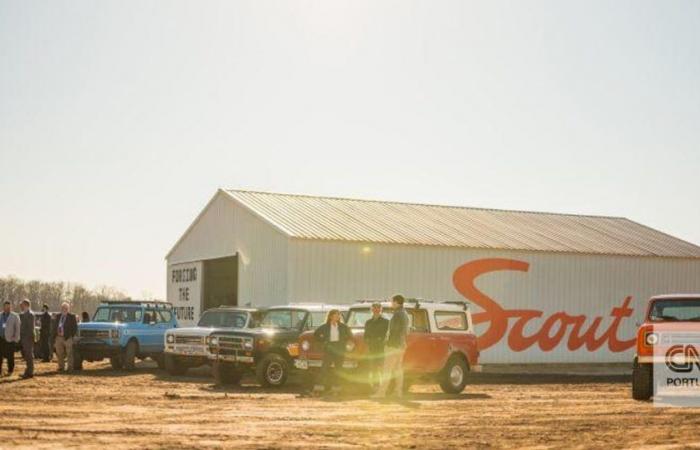The vehicles are expected to go on sale in the USA in early 2026, for 45 thousand dollars (42 thousand euros). This will put the SUV in competition with the Tesla Model Y, the Ford Mach-E and, more directly, Rivian’s new R2 SUV, another electric off-roader that is expected to hit the market around the same time.
When Volkswagen decided to relaunch the Scout SUV brand, it took a very unusual step. It created a new subsidiary company to design, build and sell vehicles destined, almost exclusively, for a single market: the United States.
Its status as a subsidiary of the Volkswagen Group, similar to that of Audi and Porsche, gives some indication of the importance of this project for VW. The renewed Scout Motors will present its new brand of electric SUVs with off-road capabilities, more or less like Rivian.
But VW is betting on something Rivian doesn’t have, a backstory. An avid fan base in America remembers the Scout fondly. Here, it was one of the pioneering SUV brands, and its original models are now collectibles.
So, just like it’s doing with the Volkswagen ID Buzz, an electric upgrade of the classic hippie station wagon, VW is using nostalgia to reach a new generation of car buyers. This time, though, it’s an American thing. The Germans wouldn’t understand. Or at least that’s what one might think.
“We truly understand the American spirit, but not only that, we also actively contribute to it,” said Oliver Blume, executive chairman of the Volkswagen Group, when speaking about the company’s global results on Wednesday. “What is very promising is the revival of the cult Scout brand. This is how we are laying the foundation for an electric SUV and pickup brand in the largest and most profitable segment in the US.”
Still, the Scout could have been introduced as a simple sub-brand, just one or two models, under the popular VW brand. Instead, Scout is striking out completely on its own.
“It’s a unique decision, but it doesn’t seem crazy to me, especially for Volkswagen, given that this is a segment in which they are not traditionally strong or well-known – and given the recognition of the Scout brand in the United States among enthusiasts,” said Erin Keating, industry analyst at Cox Automotive,
But while VW may have bought the name, the new company’s CEO is already criticizing competitors for lacking originality.
“Basically, the entire SUV market is a copycat of the Scout, not just the product but also the name,” said Scott Keogh, Scout’s chief executive. “So Trailblazer, Blazer, Discovery, 4Runner and Explorer don’t stop there. Basically, they took the name Scout, did a synonym search and used it as a result.”
The original Scout SUVs and trucks were manufactured by International Harvester in the 1960s and 70s. They were the commercial truck manufacturer’s foray into the passenger vehicle market. VW acquired the trademark for the extinct brand in 2021, when it acquired Navistar, a successor company to International Harvester. A year later, VW announced the planned revival of the Scout.
Untapped potential
The VW Group has a 5% market share of vehicle sales in the US, with the Volkswagen brand representing just under half of that figure. The rest comes from Audi, Porsche, Bentley and a little from Lamborghini. Volkswagen Group executives often refer to the North American market as a source of “untapped potential.”
Scout Motors could be a key player in unlocking some of that potential, according to Dave Mondragon, a former Ford executive who is now an industry analyst at S&P Global Mobility. But VW will have to take some difficult steps before it gets there.
“First, attract new customers to your brand who would never buy it before. Dealers like that,” he wrote in a blog on the S&P website. “Secondly, it’s about keeping customers who are already in your group, but [que] they can leave because they don’t have these types of vehicles.”
So far, Scout Motors has only shown images that suggest the appearance of possible products. Scout Motors
It’s still unclear exactly how Scout vehicles will be sold in the US. Scout Motors has not yet announced whether the vehicles will be sold through VW dealers or through a completely different dealer network, or even directly to the customer, similar to what companies like Rivian and Tesla do.
Scout CEO Keogh, who was previously head of Volkswagen North America, insists that Scout is also a start-up despite being owned by one of the world’s biggest car manufacturers. This status, he said, gives Scout the flexibility to do whatever is necessary.
“Being a startup in the position we are in, we challenge ourselves to pivot almost every day,” said Keogh. “And we have that capacity, right? Because we’re a start-up and we’re lean. We don’t have all these fixed positions.”
Being a separate subsidiary also opens up some options for VW to share the financial burden and potential risks.
An OPV in the future?
“If we want to look for a strategic investor, if we want to approach the capital markets, if we want to go for an IPO [oferta pública de venda de ações em Bolsa]these strategic doors are open,” Keough said.
Scout is hiring for just about every role imaginable, he said, from human resources to production to engineering.
The most surprising thing is that Scout is investing 2 billion dollars in its own factory. Construction work is underway in Blythewood, South Carolina, where, according to Keogh, Scout has access to a good range of suppliers. Volvo, Mercedes and BMW have long-established factories in South Carolina.
The company also has its own design center in Novi, Michigan, with its own design director, Chris Benjamin, who previously worked for Mercedes, Volvo and Jeep owner Stellantis.
Scout electric vehicles will mix nostalgic elements without being too retro, insists Keogh. So far, the company has only shown vague silhouette images of the SUV and truck. The company has tested models showing just the general shape to customers and the feedback has been good, he said.
The new Scout will be different from the classics, of course. These vehicles will have modern technology and, most importantly, they will be fully electric. That part of the plan has not changed, even with the growth of electric vehicle sales in the US market. Keogh said he is not worried.
“I look at people who own and drive electric vehicles and they love them,” Keogh said.
The industry faces challenges with battery costs and charging infrastructure, he admitted, but these aspects will be resolved. Scout’s parent company, Volkswagen, is building its own electric vehicle battery factory in Canada and a battery engineering laboratory in Chattanooga, Tennessee. And electric vehicle charging company Electrify America is also owned by VW.
The vehicles are expected to go on sale at the beginning of 2026, costing around 45 thousand dollars (42 thousand euros at the current exchange rate). This will put the SUV in competition with the Tesla Model Y, the Ford Mach-E and, more directly, Rivian’s new R2 SUV, another electric off-roader that is expected to hit the market around the same time.
If there’s one company that can do this and make it work, it’s Volkswagen, said Keating, who previously worked for VW. The company successfully manages a number of different brands around the world, often adapted to different markets. VW even relaunched Bugatti using, literally, nothing more than an out-of-use registered trademark.
Tags: Volkswagen decides revive American brand sell electric SUVs
--





